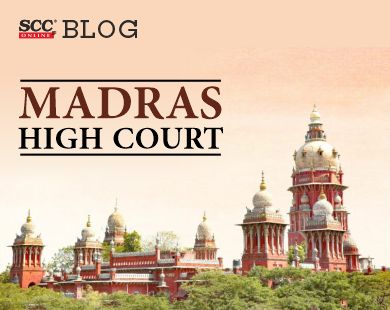Madras High Court: In a petition filed praying to direct the respondents to appoint trained and skilled non-official board of visitors to jails as per Rule 507 of the Tamil Nadu Prison Rules, 1983 for visiting each of the Central Jails and Sub Jails to address the grievance of prisoners and helping the prisoner administration on the development of correctional administration, the division bench of R. Mahadevan and J. Sathya Narayana Prasad, JJ. gave the following directions to the respondent authorities:
-
To constitute a committee to ensure periodic appointment of non-official visitors to all the prisons within the State promptly, upon expiry of the tenure of such non-official visitor.
-
To constitute board of visitors in all prisons, to periodically review and advise the prison authorities on various aspects of facilities training, correctional work etc.
-
The minutes of the meeting of the board of visitors along with the suggestions to the government shall be uploaded on the website, district/prison wise.
-
To amend the Prison Act, 1894 and the Tamil Nadu Prison Rules, 1983 in accordance with the Model Prison Manual, 2016 and the United Nations Standard Minimum Rules for the Treatment of Prisoners (‘the Nelson Mandela Rules')
-
To take appropriate measures to reduce overcrowding of prisoners.
-
To prepare a ‘Prisoners’ Rights Handbook' with information on their rights, applicable laws and regulations etc.
-
The office of the Inspector General of prisons shall prepare an annual report with the remarks and suggestions of the visitors and board across the state, and the corresponding action taken by the prison department.
-
Regular training and refresher courses shall be conducted in collaboration with the Academy of Prisons and Correctional Administration for officials and prison staff.
-
To ensure the effective functioning of visitorial system in reforming the prisons, the state government shall organize a yearly conference under the aegis of the State Human Rights Commission with the official and non-official visitors of the board of visitors across the State.
The Court examined the background of the prison’s laws and said that the Prison Discipline Committee was constituted in 1836, which made recommendations to increase the rigorousness of treatment and rejected all humanitarian needs and reforms for prisoners. Further, a consolidated Prisons Act, 1894, which currently governs prisons in India, was enacted.
The Court noted that the Model Prison Manual, 2016 provides for a system of board of visitors, and said that the visitation system is a pragmatic shift from isolation of prisoners under custody from the outside world. Community interaction is a necessary postulate in transforming prisons as correctional institutions. The board of visitors, which directly interacts with the prisoners, is the driver of such transformation by acting as a connecting thread between the authorities and prisoners. They are entrusted with the duty to enquire into the prisoners' grievances, develop suggestions for their redressal and forward the suggestions to the concerned authorities.
The Court considered the provisions concerning board of visitors under the Model Prison Manual, 2016, and said that it showed a marked difference from the Tamil Nadu Prison Rules, 1983. The board of visitors is presently required to monitor the correctional work in prisons, training and effectiveness of infrastructure in prisons; and give suggestions to improve the correctional work, and their role is not restricted to being a messenger, carrying grievances from the prisoners to the authorities. However, the duties and powers of visitors under the Tamil Nadu Prison Rules, 1983 are general i.e., to visit all parts to satisfy oneself that the rules are duly complied with, give patient hearing to prisoners' complaints, inspect the maintenance of punishment books, and ensure the food quality. Thus, the duties of visitors under the Manual have become more specific, including the duty to ascertain if any prisoner has been detained illegally. Thus, it is lucid that the State government has still not incorporated changes to its Prison Rules in accordance with the 2016 Model Prison Manual and it has also not implemented the visitation system under the 1983 Rules diligently.
The Court after examining the overall legal framework prevailing in the state, central and international levels, observed that prison administration and its reforms must be carried out by keeping the objective of the prison system in the first place i.e., reformation of inmates, their rehabilitation and successful reintegration into the society at the end of their incarceration. The prison environment and culture among the inmates instilled by such an environment are significant factors in determining the success of incarceration. Any reform in prison management in order to achieve the said purpose must start with the department of prisons and correctional services. Improving the culture among inmates and the environment by certain administrative reforms will bring about a change in the behavior of the inmates, ultimately leading to an effective incarceration system with due regard for prisoner’s rights.
The Court said that the State Government has not incorporated changes to the Tamil Nadu Prison Rules, 1983 in accordance with the Model Prison Manual, 2016 and has not effectively implemented the provisions relating to visitation system in the Rules. Therefore, it is necessary for the respondents to not only ensure the appointment of the non-official visitors and that, the duties and responsibilities are discharged by them, but also ensure that there is no delay in appointing a non-official visitor, after expiration of his or her tenure. Thus, it was held that the prison administration needs to be reformed to create a better environment and prison culture, to ensure that the prisoners enjoy their right to dignified life under Article 21.
[People’s Watch v. Home Secretary, Writ Petition (MD) No. 15321 of 2017, decided on 02-01-2023]
Advocates who appeared in this case :
For Petitioner: Petitioner-in-Person Henry Tiphagne
For Respondents: Special Government Pleader S.P. Maharajan
Additional Public Prosecutor T. Senthilkumar
*Apoorva Goel, Editorial Assistant has reported this brief.







